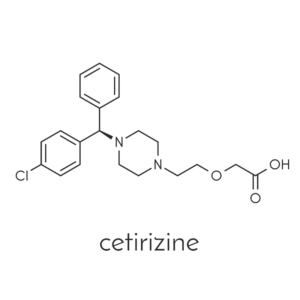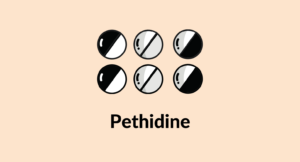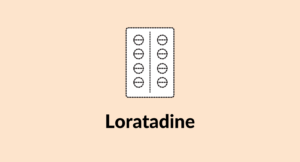
Does CBD Interact With Cetirizine (Zyrtec)?
Despite their different purposes, CBD and cetirizine may interact if taken at the same time.
The chances of serious complications are slim but not nonexistent.
CBD (cannabidiol) is widely popular for its anxiolytic, analgesic, and anti-inflammatory properties.
Cetirizine is an antihistaminic drug used to treat allergy symptoms such as runny nose, coughing and sneezing, and skin rashes.
Here’s what you need to know before you take CBD along with your allergy medications.

Does CBD Interact With Cetirizine (Zyrtec)?
CBD carries a low to moderate risk of interaction with antihistamines like cetirizine (Zyrtec).
CBD may potentiate the sedative effects of cetirizine — resulting in stronger sedative effects than either compound on its own.
Cetirizine itself has minimal sedative effects, but taking CBD with second-generation antihistamines may cause impairment in alertness and mental performance. Taking the two substances together may result in fatigue, asthenia, and tiredness, as seen in clinical trials [1].
There’s also a chance that cetirizine could reduce the effectiveness of CBD by reducing its absorption. Cetirizine inhibits P-glycoprotein (P-GP), an intestinal transporter, and plays a significant role in the absorption of drugs as they pass the digestive tract [2].
The liver only minimally metabolizes cetirizine. The main route of metabolism for cetirizine is by other reactions such as conjugation and oxidation. So, there’s minimal risk of drug-drug interactions via CYP450 enzymes.
Other Names for Cetirizine
Cetirizine is sold under many different names. All share the same risk and potential interactions.
Other names for cetirizine include:
- Zyrtec
- Aller-Tec
- Children’s Zyrtec
- Quzyttir

Similar Medications: CBD & Cetirizine
Cetirizine is a medication belonging to the second-generation antihistamine class of drugs. CBD and antihistamines have similar risks for interaction and side effects.
Medications that share a similar level of risk when combined with CBD are:
- Loratadine (Claritin)
- Bilastine (Blexten, Fortecal)
- Ketotifen (Zaditor)
- Rupatadine (Rupafin)
- Acrivastine (Semprex)
- Ebastine (Evastin)
- Mizolastine (Mizollen)
- Bepotastine (Talion, Bepreve)
Is It Safe to Take CBD & Cetirizine (Zyrtec) Together?
Combining CBD with cetirizine carries a low level of risk, but caution is advised.
Taking CBD and cetirizine (Zyrtec) should be done with care since the two could cause drowsiness or other unintended effects. Cetirizine may also decrease the oral bioavailability of CBD, which can decrease its efficacy.
It’s best to avoid operating heavy machinery as side effects like drowsiness can make these activities dangerous.
Is CBD a Viable Alternative to Cetirizine (Zyrtec)?
CBD is not an effective alternative to cetirizine (Zyrtec).
CBD helps with many health issues and is an alternative to some medications due to its safety and minimal side effect profile, but it doesn’t act as an antihistamine and therefore is not a viable alternative to chemical antihistamines like cetirizine.
Any relief CBD could provide from allergy symptoms involves the endocannabinoid system or ECS.
The ECS is necessary for the regulation of the immune system, metabolism, and central nervous system.
Cannabinoids may combat the effects of inflammation and are helpful in the management of inflammatory and immune system disorders.
In this way, CBD acts as an immune booster that can help immune disorders and might provide some relief from allergies.
However, these studies have only been performed in vitro studies and on animal models, which is why it’s not a viable alternative to cetirizine. With further studies, CBD might become a viable alternative as it has proven to have potential in managing the symptoms of allergies.
What Is Cetirizine (Zyrtec)?
Cetirizine, often sold under the brand name Zyrtec, belongs to the second-generation antihistamine class of drugs.
This drug is considered a non-sedative anti-allergy medication. It’s widely available as an over-the-counter drug used in the treatment of allergic rhinitis, dermatitis, urticaria, and allergies as a result of environmental exposure.
The medication is popular primarily due to its non-sedative property and ability to last in the system for a long time and prevent allergic symptoms.

Cetirizine (Zyrtec) Specs:
| Drug Name | Cetirizine |
| Trade Name | Zyrtec, Incidal |
| Classification | Antihistamines |
| CYP Metabolism | Minimal metabolism |
| Interaction with CBD | Agonistic interaction with non-enteric forms of CBDInhibits oral bioavailability of CBD |
| Risk of Interaction | Moderate |
What Does Cetirizine (Zyrtec) Do?
Cetirizine (Zyrtec) reduces the effects of histamine in the body, which is the most important cytokine involved in the pathogenesis of allergies. In general, the medication is highly effective against upper respiratory tract allergens and allergic attacks.
Cetirizine is most commonly used with other medications like decongestants, namely pseudoephedrine, to help alleviate symptoms quickly. It usually begins to show effects within an hour of ingesting the medication, and the results of the drug can last for well over 24 hours.
Its effects are quite similar to diphenhydramine, a first-generation antihistamine drug; however, the degree of drowsiness is drastically different between the two agents. While cetirizine, like other antihistamine drugs, can cross the blood-brain barrier, it’s in very little amounts.
This action (crossing the blood-brain barrier) is responsible for the drowsiness and sedation associated with antihistamines. It’s important to note that low or no sedation comes with 5 mg and 10 mg of cetirizine. Higher doses such as 20 mg of cetirizine can cause significant drowsiness.
This medication is known for its high affinity for H1R relative to its affinity for acetylcholine receptors, making it free of anticholinergic side effects.
Cetirizine also has anti-inflammatory properties that are especially beneficial in managing and treating urticaria or hives and asthma. The anti-inflammatory properties of cetirizine and other antihistamine drugs show potential as a treatment for atopic dermatitis, a disorder of inflammation and allergy [3].
Side Effects of Cetirizine (Zyrtec)
Cetirizine (Zyrtec) is a relatively safe antihistamine drug. However, it is a medication and, as such, has certain risks and complications associated with it. These complications are mostly self-limiting and rarely ever require medical intervention.
Some of the common side effects of cetirizine include:
- Drowsiness
- Dry mouth
- Fatigue
- Headache
- Itching
For safety concerns, alcohol use is contraindicated with cetirizine, the same as any other psychoactive agents.
Some of the more serious side effects of cetirizine include:
- Anaphylaxis
- Cardiac failure
- Edema
- Tachycardia

Key Takeaways: Does CBD Interact With Cetirizine (Zyrtec)?
CBD combined with cetirizine can cause moderate interaction, but there’s a low risk of adverse side effects. Still, always be cautious when combining medications and talk to your doctor first.
There’s a chance cetirizine could diminish CBD’s effects, and the two mixed could cause the side effects of cetirizine to be enhanced.
References
- Isomura, T., Kono, T., Hindmarch, I., Kikuchi, N., Murakami, A., Inuzuka, K., & Kawana, S. (2014). Central nervous system effects of the second-generation antihistamines marketed in Japan–review of inter-drug differences using the proportional impairment ratio (PIR)-. PloS one, 9(12), e114336.
- Mesgari Abbasi, M., Valizadeh, H., Hamishekar, H., Mohammadnejad, L., & Zakeri-Milani, P. (2016). The Effects of Cetirizine on P-glycoprotein Expression and Function In vitro and In situ. Advanced pharmaceutical bulletin, 6(1), 111–118.
- Parisi, G. F., Leonardi, S., Ciprandi, G., Corsico, A., Licari, A., Del Giudice, M. M., … & Marseglia, G. L. (2020). Cetirizine use in childhood: an update of a friendly 30-year drug. Clinical and Molecular Allergy, 18(1), 1-6.
Signup to our newsletter
Be the first to know about our newest arrivals and special offers!















